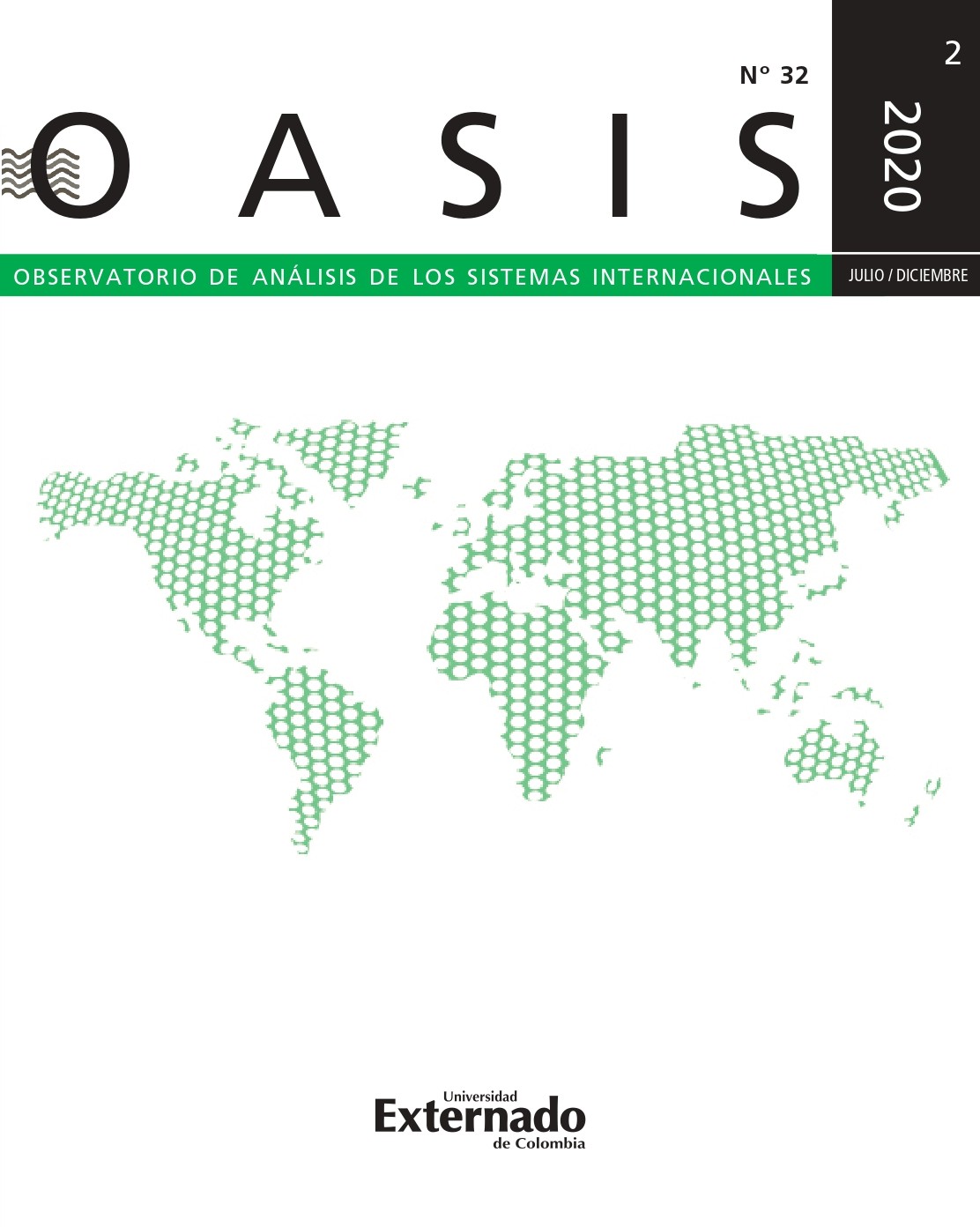Small states and international relations pedagogy: Exploring the creative agency frontier
Small states and international relations pedagogy: Exploring the creative agency frontier
Contenido principal del artículo
Resumen
Los Estados soberanos más pequeños del mundo, que de hecho comprenden la mayoría de los Estados soberanos en todo el mundo, tienen mucho que enseñarnos sobre las diferentes interpretaciones del poder. La gran parte de los estudios de relaciones internacionales (ir) se han centrado tradicionalmente en el poder como control o coerción; sin embargo, el poder también puede significar capacidad, que se logra a través de lo que este artículo identifica como agencia creativa. Aquí, la agencia creativa se define como la capacidad de acuerdo con la forma en que uno interpreta el poder y los beneficios asociados con ese poder. Por lo tanto, ciertos componentes del poder, como la hegemonía regional o global, pueden no ser relevantes para la agencia creativa; por el contrario, una identidad cultural fuerte o una economía de nicho puede ser esencial. Este artículo divide los Estados pequeños en tres categorías: (1) 2 microestados, definidos aquí como Estados con poblaciones de menos de medio millón y/o un área no marítima de menos de 1,000 kilómetros cuadrados; (2) Estados con poblaciones de entre medio millón y un millón; y (3) Estados considerados pequeños principalmente en relación con sus vecinos más grandes. Utiliza ejemplos de todas estas categorías para ilustrar el fenómeno de la agencia creativa con respecto a la formación del Estado y el tipo de gobierno y gobernanza. Debido a que el enfoque del artículo es la pedagogía, el texto incluye referencias a temas clave que los instructores pueden presentar con Estados pequeños, así como a trabajos representativos sobre Estados pequeños de ciencias políticas, derecho, historia y antropología
Palabras clave
Descargas
Detalles del artículo
Referencias / Ver
Baehr, P.R. (1975). Small States: A Tool for Analysis? World Politics 27 (3): 456-466. DOI: https://doi.org/10.2307/2010129
Baker Fox, A. (1959). The Power of Small States: Diplo¬macy in World War II. Chicago: University of Chicago Press.
Corbett, J. and Veenendaal, W. (2018). Democracy in Small States: Persisting Against All Odds. Oxford, United Kingdom: Oxford University Press. DOI: https://doi.org/10.1093/oso/9780198796718.003.0008
Corbett, J.; Veenendaal, W. and Ugyel, L. (2016). Why Monarchy Persists in Small States: The Cases of Tonga, Bhutan, and Liechtenstein, Democrati¬zation, August. DOI: https://doi.org/10.1080/13510347.2016.1212019
Duursma, J. C. (1996). Fragmentation and the Interna¬tional Relations of Micro-states: Self-Determination and Statehood. Cambridge: Cambridge University Press.
Eccardt, T. (2005). Secrets of the Seven Smallest States of Europe. New York: Hippocrene Books.
Hey, J. A. K. (ed.) (2003). Small States in World Politics: Explaining Foreign Policy Behavior. New York: Lynne Rienner.
Höll, O. ed. (1983). Small States in Europe and Depen¬dence. Boulder, co: Westview Press.
Honychurch, L. (2017). In the Forests of Freedom: The Fighting Maroons of Dominica. London, uk and Trafalgar, Dominica: Papillotte Press.
Ingebritsen, C.; Neumann, I, and Gstöhl, S. (eds.) (2006). Small States in International Relations. Seattle and Reykjavik: University of Washington and University of Iceland.
Katzenstein, P. J. (1985). Small States in World Markets: Industrial Policy in Europe. Ithaca, ny: Cornell University Press.
Klieger, P. C. (2011). The Microstates of Europe: Designer Nations in a Post-Modern World. Lanham, md: Lexington Books.
Knudsen, O. F. (2002). Small States, Latent and Extant: Towards a General Perspective. Journal of Interna¬tional Politics and Development 5: 2.
Krasner S. (1981). Transforming International Regimes: What the Third World Wants and Why. Interna¬tional Studies Quarterly 25 (1): 119-148. DOI: https://doi.org/10.2307/2600213
Ling, L.H.M. (2014). Imagining World Politics: Sihar and Shenya, a Fable for Our Times. London and New York: Routledge. DOI: https://doi.org/10.4324/9781315866994
Lobban, R. A., Jr. (1995). Cape Verde: Crioulo Colony to Independent Nation. New York: Taylor and Francis.
Nye, J. S., Jr. (2011). The Future of Power. New York: Public Affairs/ Pearson.
Nye, J. S., Jr. (2004). Power in the Global Information Age: From Realism to Globalization. New York: Routledge. DOI: https://doi.org/10.4324/9780203507292
Nye, J. S., Jr. (2008). The Powers to Lead. London and New York: Oxford University Press.
Nye, J. S., Jr. (2004). Soft Power: The Means to Success in World Politics. New York: Public Affairs/Pearson.
Salgado, R. (2017). Small Builds Big: How Ecuador and Uruguay Contributed to the Construction of una¬sur. Quito, Ecuador: flacso Ecuador.
Seibert, G. (2016). São Tomé and Príncipe 1975-2015: Politics and Economy in a Former Plantation Colony. Estudos Ibero-Americanos, Porto Alegre, 42 (3): 987-102. DOI: https://doi.org/10.15448/1980-864X.2016.3.22842
Tickner, A. and D. L. Blaney (eds.) (2013). Claiming the International. New York: Routledge. DOI: https://doi.org/10.4324/9780203758366
Tickner, A. and D. Blaney (eds.) (2012). Thinking Inter¬national Relations Differently. London and New York: Routledge. DOI: https://doi.org/10.4324/9780203129920
Tickner, A. and O. Weaver (eds.) (2009). International Relations Scholarship Around the World. London and New York: Routledge. DOI: https://doi.org/10.4324/9780203885451









